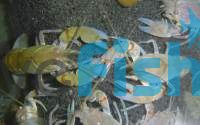Blue Claw Yabby 7cm
The Blue Claw Yabby is a species that almost anyone can identify, aquarist or not. These are a loved animal in Australia’s culture because of their eating quality and fishing or trapping them is often a school camp activity. They are however a great species to keep in the home aquarium and make for a fantastic alternative to fish due to their uniqueness and ease of care.
- Buy 4 for $17.46 each and save 10%
- Buy 6 for $16.49 each and save 15%
- Buy 8 for $15.52 each and save 20%
Blue Claw Yabby
The Blue Claw Yabby is a species that almost anyone can identify, aquarist or not. These are a loved animal in Australia’s culture because of their eating quality and fishing or trapping them is often a school camp activity. They are however a great species to keep in the home aquarium and make for a fantastic alternative to fish due to their uniqueness and ease of care.
The blue claw yabby is found all through the southern parts of Australia and is easily recognizable for its vibrant blue claws. These invertebrates look basically like mini lobsters and have a body colour that ranges from olive green to grey. As they mature the shade of blue tends to be more prevalent throughout the body. These are incredibly hardy and personable animals to keep as a pet, they can tolerate a wide range of temperatures going as low as 10 degrees and make for a great entry-level aquarium pet. Care should be taken when handling yabbies because they can give a surprisingly powerful pinch that can cause a lot of damage. These yabbies can not be shipped to Western Australia due to bio-security risks as well.
Yabbies are a relatively easy species to breed and are basically like oversized but territorial shrimp. In adequate space, multiple yabbies can be kept together. Females will carry a clutch of fertilized eggs under their tails and fan them for around 30 days. She will then release fully formed but tiny babies into the aquarium.
Tank Recommendations for your Blue Claw Tabby
Yabbies reach around 15 cm long and are surprisingly active in their environment. It's best to give them an aquarium with a decent footprint and a minimum volume of around 75 liters. This ensures that there is enough room for the yabby to make its territory and have a decent space to explore.
It is best to give the blue claw yabby either small grain gravel or sandy substrate as they like to move it around to create mounds and burrows. They will also love caves and driftwood to provide them with hiding places as well. Yabbies are not plant-safe because they are massive plant eaters, it's usually best to avoid plants or use a range of floating plants.
Suitable Tank Buddies
The yabby is an opportunistic omnivore that will prey on both live fish and plant matter in the tank. Because of this, it is usually best not to keep them with any fish or to avoid slow-moving species. Blue claw yabbies do molt as they grow, this means that they can often be vulnerable right after a molt to predators as they will be very soft.
Usually Compatible
Fast, top-dwelling fish like rainbows, giant danios, and very large species that may not prey on yabby.
Sometimes Compatible
Goldfish, angelfish, mid to bottom dwelling species which may become an easy target for the yabby or expose themselves to ongoing bullying.
Rarely Compatible
Any large growing species that actively prey on crustaceans such as pufferfish. Slow moving fish like neon tetras will also become an easy meal for the yabby as well.
Feeding your Blue Claw Yabby
As the blue claw yabby is an opportunistic feeder, they will make to aquarium foods really well. It is best to feed them a sinking pellet that contains high protein levels for optimal growth. They can also be fed a range of green and vegetable matter which ensures that the water does not get polluted easily.
| Scientific Name | Cherax destructor |
|---|---|
| Care Level | Easy |
| Common Names | Blue Claw Yabby, yabby |
| Diet | Omnivore |
| Fish Family | Parastacidae |
| Lifespan (years) | 7 |
| Max. Length (cm) | 15 |
| Min. Tank Volume (l) | 75 Liters |
| Origin | Australia |
| Reef Safe | No |
| Sociability | Semi-aggressive |
| Venomous | No |
| Water Conditions | 10-26° C, pH 6.0-7.0 |




